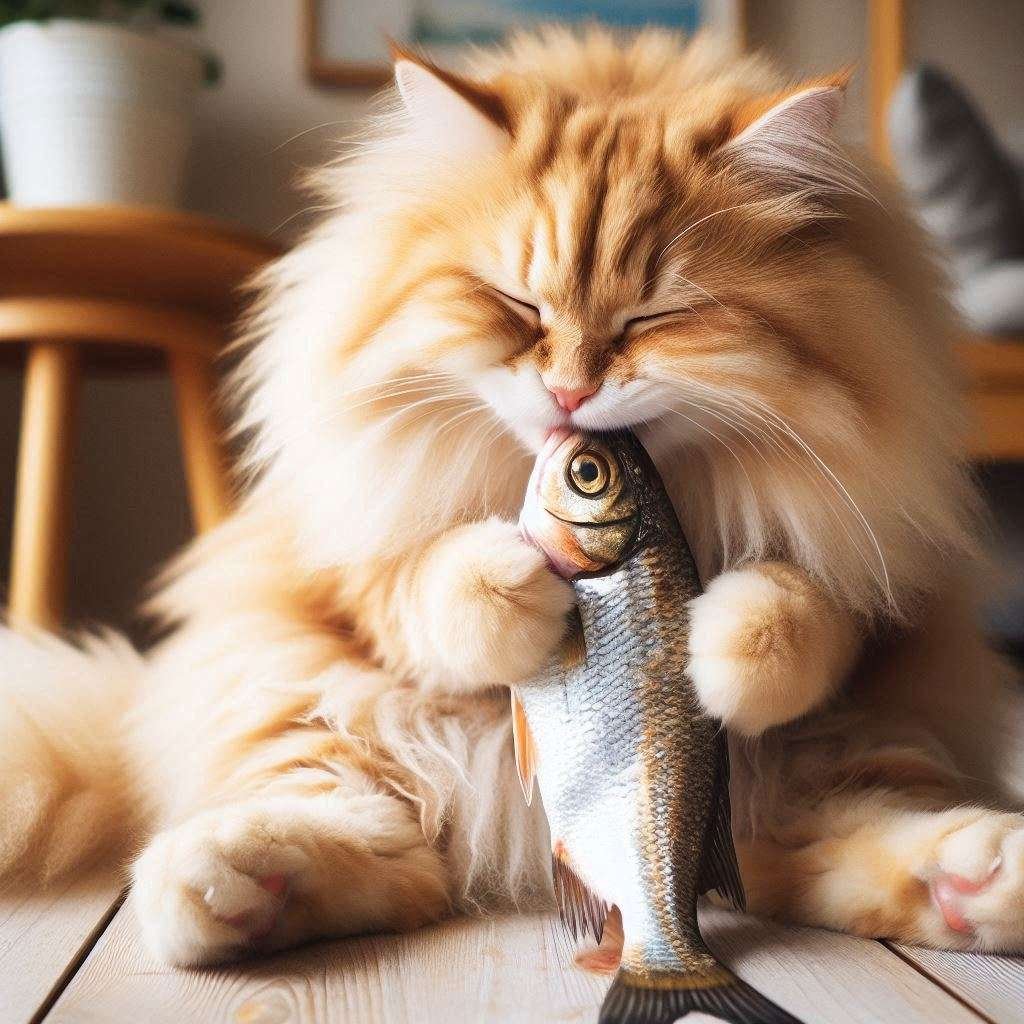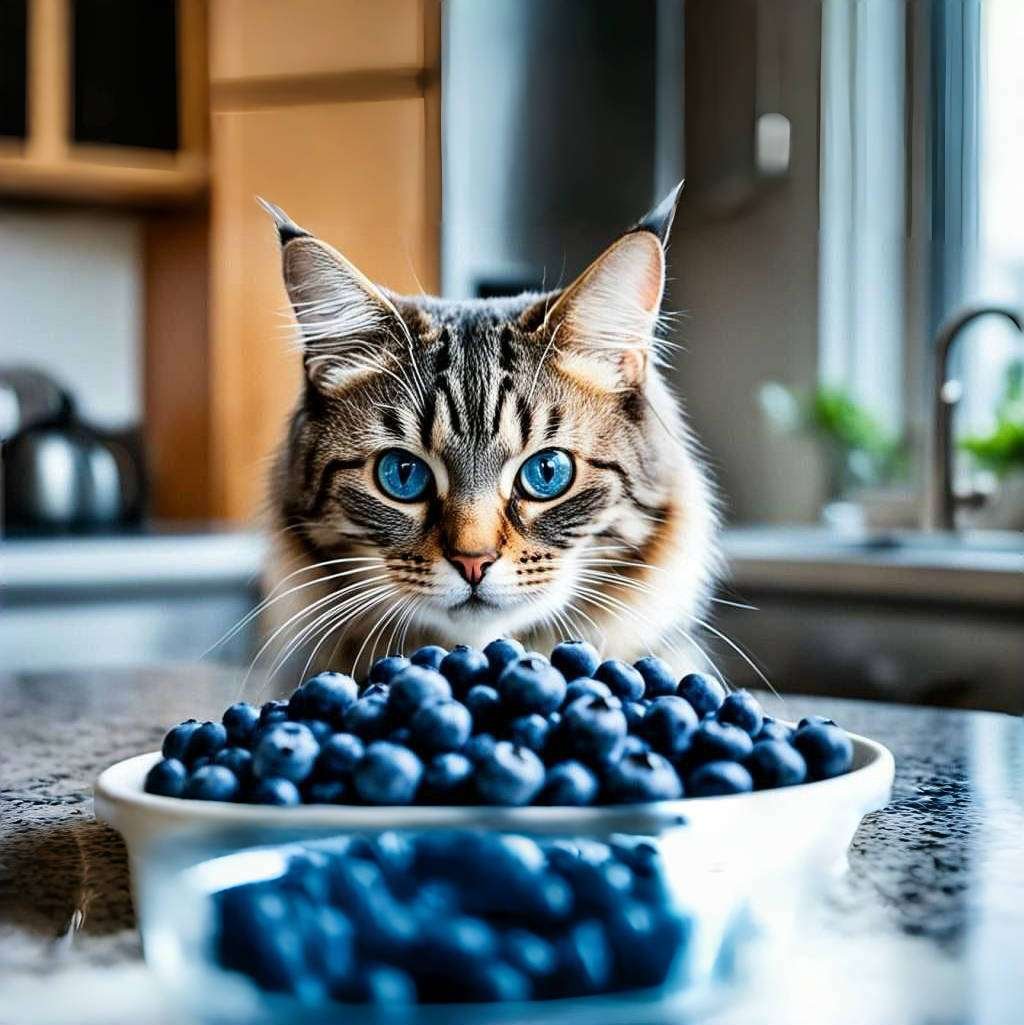Many pet owners ask Can My Cat Have Yogurt? or can cats can eat yogurt? but it’s key to know the details about cats and dairy. Yogurt has lactose, which cats might find hard to digest and could cause stomach problems. Also, flavored yogurts might have things that are bad for cats. This article will look into the good and bad of giving yogurt to your cat.
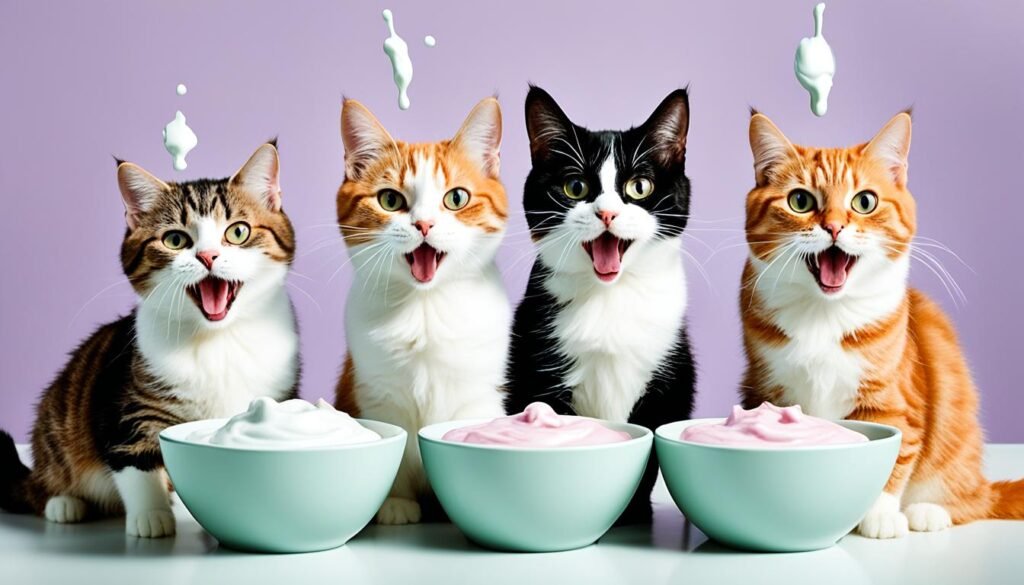
Key Takeaways
- Cats are usually lactose-intolerant, but some yogurts with active cultures might be okay in small amounts.
- Yogurt is a good protein source for cats, with about 9 grams per 6 ounce serving.
- Greek yogurt has less lactose and more protein than regular yogurt, making it a better choice for cats.
- Cats should only have a little yogurt because more is needed for the probiotics to work well.
- Flavored yogurts might have things that are toxic to cats, so it’s best to use plain, unsweetened yogurt.
The Dairy Myth and Cats
Many people think cats can eat dairy like milk or yogurt without problems. But, most cats are lactose intolerant. They don’t make the enzyme lactase after they stop nursing. This can cause stomach issues if they eat too much dairy.
Lactose Intolerance in Cats
Cats start losing lactase around 12 weeks old. So, they get more lactose intolerant as they get older. Eating dairy can lead to diarrhea, gas, and belly pain in adult cats.
Kitten Tolerance to Dairy
Kittens can handle dairy better because they still have lactase. But, this changes as they grow and eat more meat. Watch how a kitten reacts to dairy and introduce it slowly to prevent gastrointestinal issues.
“Cats are more likely to experience dairy intolerance compared to dogs. Some dogs can digest milk throughout their lives without issues, but not all dogs.”
The idea that cats can easily eat dairy is a myth. Most cats have trouble with lactose intolerance. They need cat-friendly food and water sources instead.
Can Cats Eat Yogurt?
Cats can technically eat yogurt, but with caution. Yogurt’s live cultures make it easier for cats to digest than other dairy products. Still, cats might get upset stomachs from the lactose in yogurt. It’s best to feed them cat yogurt in small amounts, choosing plain, unsweetened kinds.
Research says don’t give kittens yogurt because their stomachs are very sensitive. But, cats can safely eat yogurt in small amounts. Yogurt has protein, calcium, and vitamins that are good for cats.
- Yogurt has probiotics that help with digestion, but cats should get probiotic supplements instead.
- Start with just one teaspoon of yogurt to see if your cat likes it.
- Treats should not make up more than 10% of a cat’s daily calories, with the rest from balanced cat food.
Cats can eat yogurt, but be careful with the type and amount. Some yogurts have sugar substitutes like xylitol, which is bad for cats. Always choose plain, unsweetened yogurt to keep your cat safe and healthy.
Benefits of Yogurt for Cats
Yogurt isn’t a must-have for cats, but it can be a good treat in small amounts. It’s packed with protein that helps with muscle growth and health. Plus, it has calcium, vitamins B2 and B12, potassium, and magnesium. But, these nutrients are already in balanced cat food, so yogurt should be a rare treat.
Protein in Yogurt
Yogurt is a great protein source for cats. This protein supports their muscle development and health. Cats need a lot of protein to stay active and healthy.
Vitamins and Minerals in Yogurt
Yogurt also has vitamins and minerals that are good for cats. It’s full of calcium, vitamin B2, vitamin B12, potassium, and magnesium. These help keep a cat’s bones strong, metabolism running smoothly, and overall health good.
Remember, while yogurt has benefits for cats, it should be given in small amounts as a treat. Cats need a diet mainly of meat to get what they need. Yogurt shouldn’t replace their regular food.
can my cat have yogurt
If you’re thinking about giving your cat yogurt, know the good and bad sides first. Yogurt has probiotics, which are good bacteria for your cat’s gut. These can help with diarrhea and gas, making cats with sensitive stomachs feel better.
But, be careful when giving yogurt to your cat. If your cat often has tummy troubles, talk to your vet about a special probiotic for cats. This way, your cat gets the right kind of probiotics and other nutrients they need.
Probiotics in Yogurt for Feline Digestion
- Yogurt can be a good source of probiotics for cats, helping with digestion and lessening stomach issues.
- The probiotics in yogurt help keep the gut healthy, which is good for digestion.
- Yogurt’s probiotics are great for cats with sensitive stomachs or those feeling sick from digestive problems.
Cats need a diet rich in animal proteins and fats because they are obligate carnivores. So, yogurt should be given as a rare treat, not a main part of their diet. Always check with your vet to make sure your cat is getting the right nutrients for good health.
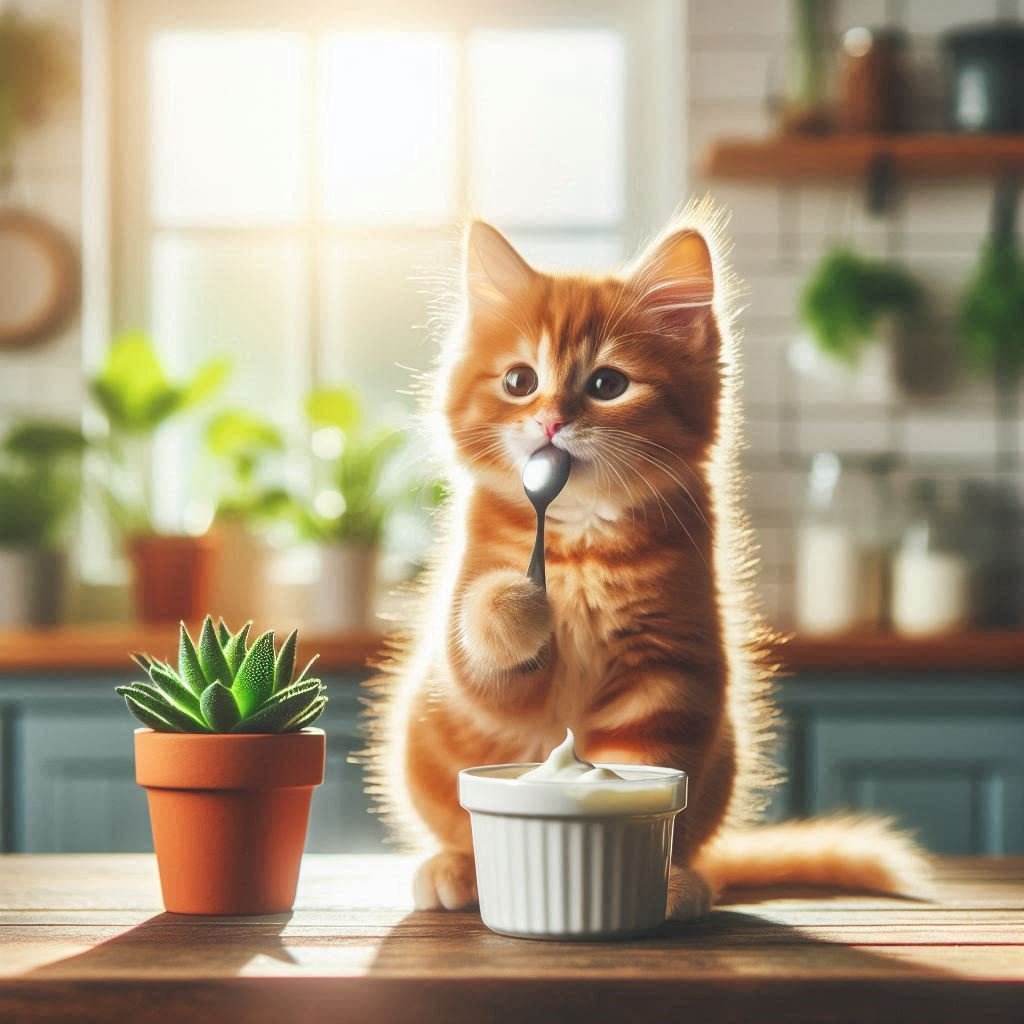
“Probiotics in yogurt may help reduce issues like diarrhea and gas in cats, offering a potential solution for felines with sensitive stomachs.”
Risks of Feeding Cats Yogurt
Yogurt is safer for cats than many dairy items, but it has risks. Cats might get diarrhea and vomiting if they eat too much lactose from yogurt. Also, flavored yogurts can have sweeteners and additives like xylitol that are bad for cats. Always give your cat plain, unsweetened yogurt in small amounts.
Lactose and Stomach Upset
Cats can’t digest lactose well because they don’t have the enzyme lactase. Eating too much lactose from yogurt can upset their stomach, causing vomiting and diarrhea. It’s best not to give cats more than a teaspoon of yogurt a week to keep them from getting sick.
Toxic Ingredients in Flavored Yogurts
Flavored yogurts often have harmful sweeteners, artificial flavors, and additives. Xylitol is especially bad because it can lower a cat’s blood sugar and harm their liver. Always give cats plain, unsweetened yogurt to avoid these dangers.
Also, giving cats high-calorie treats like flavored yogurt can lead to obesity and diabetes. Cats need fewer calories than dogs, and too many calories can cause weight gain and health problems.
In summary, a little plain, unsweetened yogurt is okay for some cats, but be careful. Always follow the recommended amount and skip the flavored kinds to keep your cat safe and healthy.
How to Feed Yogurt to Your Cat
Feeding your cat yogurt can be tricky. Some cats like the creamy texture and tangy taste. But, most adult cats can’t digest dairy well because they lack the needed enzyme.
If you want to give your cat yogurt, start with a small amount, like one teaspoon or less. Choose plain, unsweetened yogurt. Avoid flavored or low-calorie kinds that might have bad stuff like xylitol or extra flavorings.
Watch your cat for signs of upset stomach, like diarrhea or vomiting. If your cat has a bad reaction, stop giving them yogurt. Yogurt should be a rare treat, not a daily food.
Instead of regular yogurt, try Lick-e-Lix or yogurt drops made for cats. These give your cat the good stuff from probiotics without the risk of lactose problems.
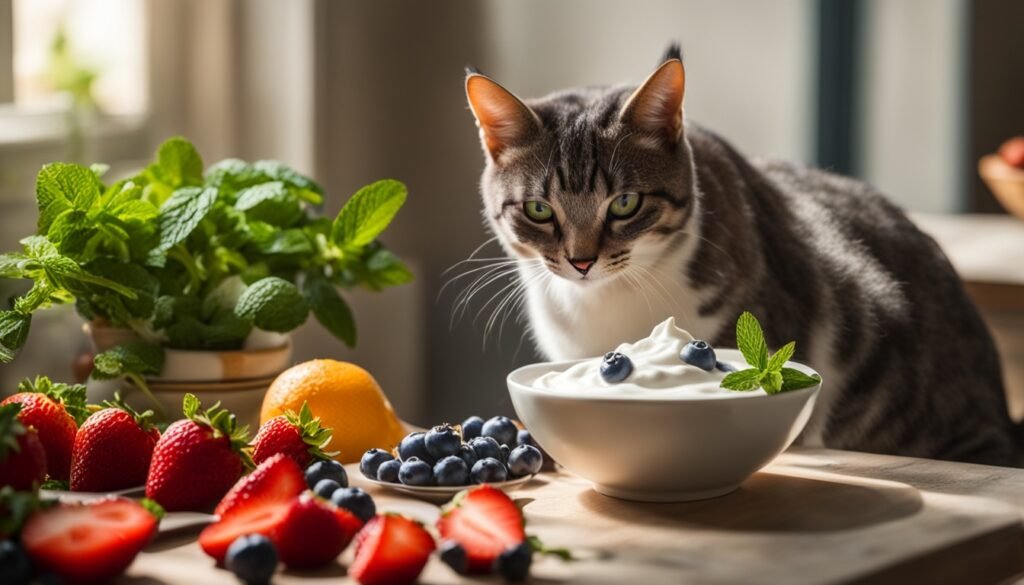
“Feeding your cat the right amount of cat-friendly dairy products can be a delightful experience, but it’s important to do so with caution and moderation.”
Is Yogurt Good for Cats?
Nutritional Value vs. Complete Diet
Yogurt can offer some benefits for cats, but it’s not a must-have in their diet. Cats need a diet rich in animal protein to stay healthy. This is because they are obligate carnivores.
A cat food made by vets is the best choice for your cat’s health. It gives them all the nutrients they need. Yogurt should be given as a small treat, not as a food substitute.
Many adult cats can’t digest lactose well. This can cause stomach problems like diarrhea, bloating, and vomiting. These issues can start within 8-12 hours after eating dairy.
Yogurt has good stuff like protein, calcium, B vitamins, and probiotics. But, it lacks some essential amino acids cats need. Giving cats too much yogurt can lead to weight gain, obesity, diabetes, and heart disease.
It’s best to keep yogurt to less than 10% of a cat’s daily calories. This helps avoid health problems. Plain, unsweetened yogurt is safest, as flavored yogurts have lots of sugar and artificial sweeteners that are bad for cats.
“Cats are obligate carnivores and require a diet that is high in animal-based protein to meet their unique nutritional needs.”
In summary, while yogurt has some benefits, it shouldn’t be a key part of a cat’s diet. A complete and balanced cat food made by experts is best for your cat’s health.
Safe Yogurt Alternatives for Cats
If you want to give your cat a dairy treat, there are safer choices than yogurt. Lactose-free milk or kefir are good options because they have less lactose than regular milk. These can help your cat enjoy dairy without stomach problems.
Consider non-dairy treats made just for cats too. Meat-based snacks or cat-specific probiotic supplements can help your cat’s gut health without the risk of lactose intolerance. These treats can make your cat happy with something creamy but won’t harm them.
When picking safe foods for cats, be careful with dairy. Some cats can have a little yogurt, but others might get sick. Looking into cat-friendly dairy substitutes lets you give your cat a tasty, healthy treat that fits their diet.
“The key is to introduce any new food, including dairy alternatives, slowly and in small portions to monitor your cat’s reaction.”
Yogurt has its perks, but it’s not a must for cats. A good, AAFCO-approved cat food should be the main part of their diet. Knowing the safe foods for cats and cat-friendly dairy substitutes helps make sure your cat is happy and healthy.
Cat-Friendly Dairy Substitutes
Yogurt might not always be the best choice for cats. But, there are many dairy-free options that can help. These alternatives offer great nutrition for your cat’s health and digestion.
Probiotic Supplements for Cats
Probiotic supplements are a great choice instead of yogurt. They’re made just for cats and help with digestion. These supplements give your cat the good bacteria they need without the lactose in dairy.
By adding probiotics to your cat’s diet, you keep their gut healthy. This helps with digestion and boosts their cat digestive health.
There are many types of probiotic cat dairy substitutes, like powders, capsules, and chews. Pick the one your cat likes best. Make sure it has bacteria strains that are good for cats’ digestion.
| Probiotic Strain | Benefit for Cats |
|---|---|
| Lactobacillus acidophilus | Supports digestion and nutrient absorption |
| Bifidobacterium animalis | Helps maintain a healthy gut microbiome |
| Enterococcus faecium | Enhances immune function and reduces inflammation |
Adding probiotic supplements for cats to their diet is a smart move. It gives them the good bacteria they need. This way, you avoid the risks of dairy products.
Conclusion
While cats can eat yogurt, it’s not a good idea to make it a regular part of their diet. Yogurt has lactose, which can upset many cats’ stomachs. Flavored yogurts might also have ingredients that are harmful to cats.
If you do give your cat yogurt, make sure it’s plain and unsweetened. Cats are better off with a balanced diet designed just for them. Sometimes, a safe treat or supplement can help keep them healthy. Always talk to your vet if you’re unsure about what to feed your cat.
Cats like the taste of yogurt, but they need different foods than humans do. They are meant to eat mostly meat, not dairy. Feeding them yogurt, even a little, can cause health issues, especially if they can’t digest lactose.
Deciding to give your cat yogurt should be a careful choice, with your vet’s advice. Start with a small amount and watch how your cat reacts. Always make sure your cat eats a balanced, high-quality diet that fits their needs.

